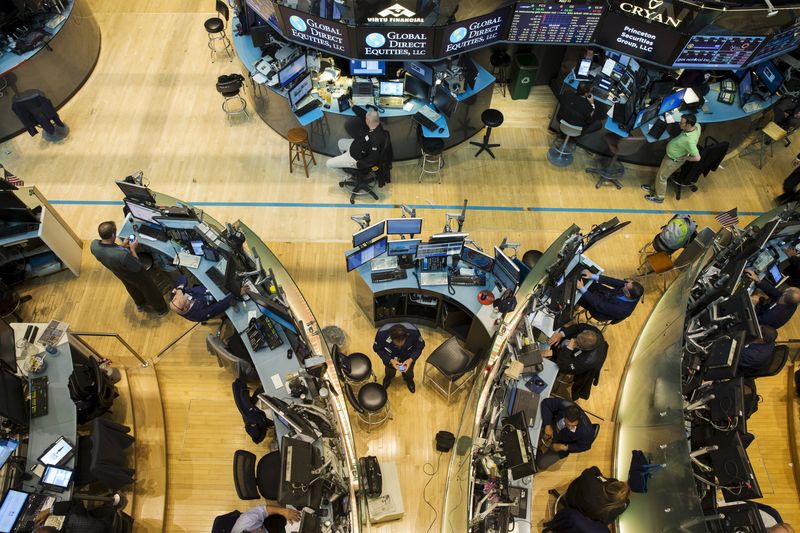By Geoffrey Smith
Investing.com -- Bond markets calm down after Thursday's inflation shock, but stocks are set to open lower again amid fears that the Federal Reserve will do more, and faster, than previously expected to bring inflation down. ECB President Christine Lagarde tries to restore calm to Eurozone bond markets with a more dovish message. The Michigan Consumer Sentiment index, with its gauge of inflation expectations, tops the data calendar, while oil prices rise again after the International Energy Agency says the world's oil demand has been understated for the last three years. Here's what you need to know in financial markets on Friday, 11th February.
1. Bonds adjust after Bullard's punchy message
The 10-Year Treasury note yield is set to open at over 2% for the first time in three years later, while the 2-Year note yield is at 1.60%, after another upward repricing of U.S. interest rate expectations on Thursday.
While the markets initially took January’s 40-year high in inflation reasonably calmly, they took fright again as St Louis Federal Reserve President James Bullard told Bloomberg that he wanted a full 100 basis points of tightening by July 1.
Bullard is a relatively marginal voice on the Federal Open Markets Committee, but he is a voting member this year and, more importantly, the fact that he turned hawkish before the Washington, D.C.-based board is creating the impression that he is a leading indicator of the Fed’s policy direction. As such, his words are having more impact on markets than they usually might have.
2. Lagarde tries to smooth the bond market waves; U.K. economy shrugs off Omicron
It’s a different story in the Eurozone, where ECB President Christine Lagarde had to resort to another lengthy interview undoing the policy signals that she gave in her press conference last week.
Lagarde said that there dangers in acting too hastily and said that “all of our moves will be gradual”, starting with the reduction of asset purchases in April. Her more conciliatory tone allowed a big Italian bond sale to pass off without incident, although the 10-year yield spread with Germany – a rough proxy for financial stress in the Eurozone – remains at over 150 basis points, its highest in 18 months.
Elsewhere in Europe, U.K. GDP fell by less than expected in January, suggesting that the economy coped better with the Omicron wave of Covid-19 than first thought. GDP was still below its pandemic level at the end of 2019, however, in contrast to the U.S. and much of Europe.
3. Stocks set to open lower; Affirm, Zillow , Under Armour (NYSE:UA) in focus
Bond markets may have settled a little but U.S. stocks are still under pressure and set to open with fresh losses, creating the impression that this week’s gains have been essentially a bear market rally.
By 6:20 AM ET, Dow Jones futures were down 140 points, or 0.4%, while S&P 500 futures were down 0.6% and NASDAQ 100 futures were down 0.8%. As such, all three are on course to end the week with modest losses.
Thursday’s inflation data will ensure that the inflation expectations component of the Michigan Consumer Sentiment index attracts attention later, while stocks in focus include Buy Now Pay Later specialist Affirm (NASDAQ:AFRM), which had the now-familiar -20% punishment beating in response to weak guidance late on Thursday.
Other stocks in the spotlight include Zillow (NASDAQ:Z), which looks set for a bounce after its numbers, Expedia (NASDAQ:EXPE) – which also put out strong earnings and guidance after the bell, and British American Tobacco (NYSE:BTI), after it increased its shareholder payouts. Under Armour, Newell Brands and Dominion Energy report early.
4. Ontario court to rule on trucker protests as auto sector suffers
Ontario's Superior court will hear a motion from the Canadian city of Windsor seeking a court order to clear protesting truckers from the most important road crossing between the U.S. and Canada.
The Ambassador Bridge has been blocked for four days by truckers protesting against the Liberal Party government's vaccine and mask policies, disrupting the flow of trade and threatening to prolong the supply chain agony being felt by Detroit-based automakers in particular.
The bridge closure has already forced Ford Motor (NYSE:F) to cut output at an engine plant in Windsor and at an SUV factory in Oakville, west of Toronto, the Wall Street Journal reported the company as saying.
5. We've been burning way more oil than we thought, IEA says
The International Energy Agency revised its estimates of past world oil demand higher, suggesting that the global market is even tighter than first thought. In its monthly report, the agency increased past baselines for demand by between 770,000 and 970,000 barrels a day over the last three years and raised its 2022 forecast by 870,000 barrels a day. That puts the current low inventory levels into even sharper relief.
U.S. crude futures prices rose back above $90 a barrel in response to the news, while Brent crude rose 0.8% to $92.13 a barrel, as talk of a quick lifting of Iranian sanctions took a back seat.
Baker Hughes’ rig count, which hit its highest since April 2020 last week, will show how quickly U.S. shale producers are reacting to the surge in prices.
